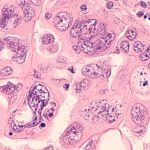A new antibiotic created to treat some of the very worst “superbug” infections is saving the lives of UPMC patients with no options left.
Called ceftazidime-avibactam, or Avycaz, the drug was approved by the U.S. Food and Drug Administration earlier this year, and UPMC has used it in more than 20 patients since May.
 “There’s a definite unmet need when it comes to patients whose infections are resistant to every other antibiotic out there – there just isn’t a standard of care for these infections,” said Brian Potoski, Pharm.D., associate director of UPMC’s antibiotic stewardship program. “Fortunately, we have a novel program at UPMC that is able to proactively identify patients who are good candidates for this drug and then monitor their progress in order to collect data that could help future patients both here and at other hospitals nationwide.”
“There’s a definite unmet need when it comes to patients whose infections are resistant to every other antibiotic out there – there just isn’t a standard of care for these infections,” said Brian Potoski, Pharm.D., associate director of UPMC’s antibiotic stewardship program. “Fortunately, we have a novel program at UPMC that is able to proactively identify patients who are good candidates for this drug and then monitor their progress in order to collect data that could help future patients both here and at other hospitals nationwide.”
The Extreme Drug Resistance – or XDR – lab at UPMC Presbyterian is constantly collecting and analyzing samples from patients with infections to watch for mutations and to see what the most prevalent drug-resistant infections are in Western Pennsylvania. In collaboration with the antibiotic stewardship team, UPMC physicians can then use this data to help determine the best approach to treating their patients.
Nationwide, patients with bacterial infections that are resistant to the last-resort, broad-spectrum antibiotic carbapenem have a 50 percent chance of dying from the infection. Of the patients treated at UPMC with the new drug, preliminary evidence shows a marked improvement in outcomes, with patients more likely to recover from their infections.
The World Health Organization and the White House, among others, recently made announcements declaring the effort to address antimicrobial resistance a top priority. In addition to using the best possible drugs to fight antibiotic-resistant infections, UPMC is also leading studies to prevent that resistance from evolving in the first place.
Using Avycaz in patients who are most likely to benefit from it and have no other options is critically important to ensuring that the superbugs don’t quickly evolve to resist it, too, which is what happens when antibiotics are misused.
“This drug is available to any hospital that wants to buy it and use it, making good antibiotic stewardship – like what we have at UPMC – so necessary,” said Dr. Potoski, also an associate professor of pharmacy and therapeutics in the University of Pittsburgh School of Pharmacy. “If used appropriately, I think we’ll get good longevity out of this drug.”









